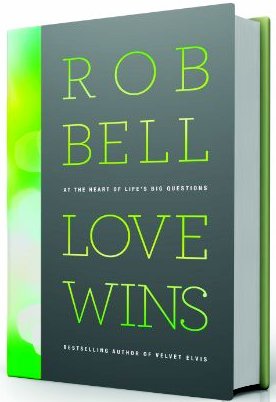
Updated: 6:51 pm GMT, 3/19/2011
Well, if you follow this blog you'll notice I've tried to step back from all the hoopla surrounding Rob Bell's recently released church bonfire fuel, Love Wins. But try to avoid it as I may, the onslaught of ridiculous things said about it on the web and the thoughtful things my friends in Aberdeen have said about it, especially since a few of them have now actually read it, has brought me to order it for myself: it'll be here on Tuesday and I'll read it by next weekend - expect some thoughts to follow, if I have any. In the meantime, I've also been encouraged that some thoughtful and respectful reviews have finally started to appear.
- Fuller President Richard Mouw has a good one here.
- Steve Holmes, senior lecturer in systematic theology at the U. of St. Andrews, has a great review series of it . So far there are three parts:
- Part 1, arguing that though the book is flawed, it is nonetheless important and worth reading for its suggestions that what is wrong with what many Christians have been taught about salvation and life-after-death brings with it a quite unbiblical view of who God is, also that Bell is unambiguously not a Universalist.
- Part 2, arguing that virtually all the pillars of Reformed Orthodoxy (Edwards, Hodge, Warfield, etc.) support Bell's contention that there will be vastly more people in heaven than in hell, though this is one of the most attacked claims in the book.
- Part 3, arguing that Bell has taken an unfortunately reverted to the use of loaded questions, caricature, otherwise less than gracious tactics in this book, unlike his previous books. This entry seems a bit cut off, like he was in the middle of developing a larger point and accidentally hit the "publish" button.
- David Congdon has done an expansive (over 13,000 words!) response to a review of Bell's book by Mark Galli, senior managing editor of Christianity Today. The review is broken into five parts; an index can be found here. I've just begun reading this one myself; the stated intent is to challenge Galli's characterization of Bell as a liberal in opposition to orthodox Evangelicalism.
- Finally, though Bell doesn't call himself a Universalist, Robin Parry calls himself one and has a helpful article in the Baptist Times making clear what Christian Universalism is and what it isn't.
You neglected the most extensive response: "Beyond Binaries: A Response to Mark Galli."
ReplyDeleteIndeed I have, and that is because I have not made my way through it yet and so didn't want to endorse it without having done so. However, considering the source, that is probably overly cautious - I'll update to link it and get cracking on reading it myself. Thanks for the tip, Travis!
ReplyDeleteI love your last paragraph and I fear that is true as well. I consider myself Reformed (broadly), yet I am very frustrated with the Young, Restless, and Reformed movements' response to the book. I have two posts over on my blog about the whole situation, if you want to check them out and let me know what you think. http://wp.me/p1qpEG-9
ReplyDeleteHow much longer will you be at Aberdeen? I will be there this fall to work on a PhD with Prof. Webster....